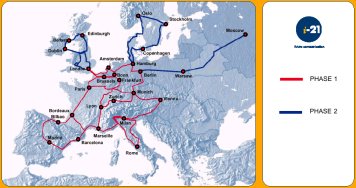
| Pendle.Net -> News -> Internet (Latest) -> Internet: 05July 1999 |
Internet Story: 05 July 1999
 |
|
| Note: Well, it has been a while since the last update - my time has almost all been taken up with development work for one of our major corporate clients. I hope to get back to more frequent updates this month. Andrew Stringer |
The net gets faster Is Europe about to surpass the US in the speed of its Internet backbone? Plans for a "petabit network" were unveiled earlier this week. This network, being built by French company Alcatel, will connect 70 major cities in 17 countries across Europe with a system that will be capable of carrying 1000 Terabits (1 Petabit, 1,000,000,000,000,000 bits!) per second of information around it. Couple this with the allegedly imminent (September 1999) rollout of ADSL by BT and we could soon have enough bandwidth for some serious multi-media internet applications (like movies on demand). The petabit network should be almost all operational by the end of 2000. Phase #1 should be complete by May 2000. Britain is in Phase #2. See the I-21 site for more details.
¿Habla usted el español? If you do then maybe you don't speak German, French, Italian or Portuguese. Now you can translate phrases in English to one of these languages (and vice versa for some), on the web. Just go along to FreeTranslation.com and type in your phrase. You can also translate web sites too (as you can with Altavista's BabelFish). May come in useful in the holiday season.
Future of Local News on the Net Are online users taking over from traditional news organizations? There seems to be a great deal of paranoia in the traditional news industry at the moment - will they soon become consigned to the history books? At NetMedia99 (The Internet Conference for Journalists) this perception has been at the forefront. "We are not gatekeepers anymore, the city walls are down, we don't own customers, we don't control information," said Steve Yelvington, Executive Editor of Cox Interactive Media in the US. This is rapidly becoming very relevant to regional news media. Steve Outing has long been running articles about how the local news media needs to wake up and cast off its archaic practices and grasp the challenges of the Net (e.g. this article and this) or they won't be around in a few years time. So will local newspapers survive? If they get out of their box and re-invent themselves they could become a dominant force in local e-commerce - there's one asset that they have that ad-hoc news provision from online users don't and that's - credibility as trusted guides. It's very hard to determine just how true information is, how thoroughly it has been researched, and what angle it's coming from on sites like slashdot, geocities and other "community" sites. A journalist with a good reputation for reporting accurately is going to be a very valuable person in the new order. Local news organizations need to become more than just news providers, they need to be building online local communities, reaching out and establishing relationships with local online sites, and spearheading local e-commerce activities (especially in the UK where this is still an open field). Check out what the Roanoke Times is doing, then see how the small town paper, Sonoma Index-Tribune, and others, do things.
Ask Tony Now here's an example of the "trusted guide" at work. At the moment we usually search for things on the Net by typing in keywords or phrases into a search engine or directory such as Yahoo!. The results can often be a bewildering mass of thousands of meaningless results from which you are supposed to sift through and glean some wisdom. Enter Ask Tony. Ask Tony is a new type of search engine that is run by humans not computers. You can enter a phrase, just like in traditional search engines but there the similarities end. Instead of some automated database query returning the results you get a team of human volunteers that will search and filter out the garbage and make sense of the results returned. Well, that's the theory. This service is still in its infancy but in its first week dealt with about 500 queries. Obviously results are not returned quite as quick as traditional search engines.
Andrew Stringer, © Pendle.Net Ltd, 1999
Permanent Address: http://www.pendle.net/News/Inet19990705-1.htm